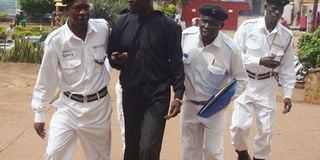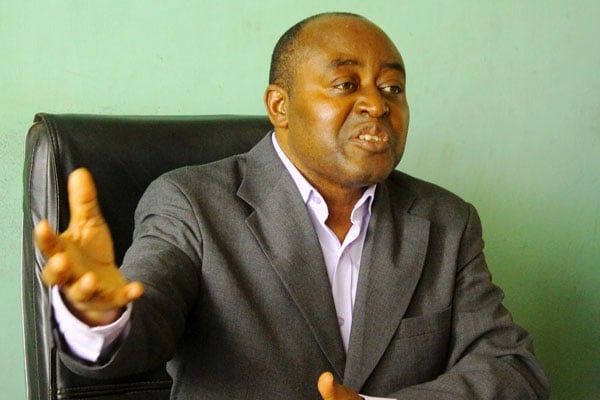The penalty you face for breaking traffic rules

LONG ARM OF THE LAW: A traffic police officer arrests a motorist. PHOTO BY PATRICK ONGOM KOMAKECH
What you need to know:
Daily Monitor’s Anthony Wesaka revisited the laws and profiles some of the offences you should avoid—and what penalty you might pay if found guilty.
During the festive season, the roads turn into butchers of sorts, claiming hundreds of lives in accidents. It is also the time when many a driver are waved down by traffic Police over various offences. Daily Monitor’s Anthony Wesaka revisited the laws and profiles some of the offences you should avoid—and what penalty you might pay if found guilty.
Driving in excess of prescribed speed.
In this season most drivers are in a rush, whether to get to the village on time or for the taxi and bus drivers, it’s to make as many trips as possible.
This could compel you to hit the accelerator too hard—and breaking the law. The speed limit on most of the highways is 80kph. If found guilty, the offence attracts a fine of Shs100,000.
Failure to cede right of way
When you hear that siren accompanied by flashing of bright lights, please give way. That is an authorised emergency vehicle that has the right of way.
Some of these include presidential and VIP convoys, hospital ambulances, bullion vans and Police cars on duty.
If you fail to give right of way, you will pay a Shs100,000 fine.
Failing to report an accident
The law demands that once you are involved in an accident, especially if you are the guilty party (say you knock someone), you must report that accident within a period of 24 hours after it happened. You must also give your particulars to the Police.
If you are found guilty of failing to report an accident, you will stay in jail for six months.
Non-payment of the charge made at a street parking place
Remember that when you park on Kampala streets and even some upcountry towns, there are service providers who demand a parking fee. In Kampala, Multiplex owns the street parking rights, charging Shs400 for the first hour and another Shs400 for the next 30 minutes.
Dodging parking fees means your vehicle will not only be clamped but you risk paying a fine of Shs20,000.
Driving without a valid driving permit

A MUST: Motorists must carry a driving permit all the time. PHOTO BY STEPHEN WANDERA
The first thing any traffic officer will require from a driver is their valid driving permit.
To avoid inconveniences during festivities, make sure you have your valid driving permit—at worst, its duplicate. It comes in handy especially if you are involved in an accident.
Driving without a driving permit calls for a Shs40,000 fine, a similar penalty suffered if the permit has expired. But the punishment could be severe if say you are involved in an accident.
Drink driving
Local research shows that 20 to 30 fatal accidents in Kampala every week are a result of drink-driving. The call for not driving when drunk is as old as motoring.
However, motorists continue to break the rules—with fatal results. The Police insist that if one drinks, they either get a sober friend to drive them or hire a taxi. Many traffic police officers will man the roads countrywide during Christmas with breathalyzers by their side as they wait to catch you for driving under the influence of alcohol.
The penalty for sitting behind the wheel while under influence of alcohol is Shs50,000.
Carrying excess passengers or luggage
As you travel to the village or head out for a retreat, make sure you are not overloading that car—either with luggage or passengers.
All cars have a tonne limit they can carry and this is clearly inscribed on the vehicle.
For example the average taxi should not carry more than 14 passengers. Putting that extra load in the car will cost you Shs40,000.
Driving while talking on phone

AVOID: Talking on the phone while driving is illegal. PHOTO BY YUSUF MUZIRANSA
Research has shown that the chances of being involved in a car accident while using a cellular phone is nearly equal to the chances of having an accident while slightly drunk. The way out for this is to use a headset so that you don’t have to place the phone on your ears. It also allows you to concentrate on driving. The fine is Shs40,000.
Observe the traffic lights
Traffic lights, which may also be known as stoplights, traffic lamps, stop-and-go lights, robots or semaphore, are signaling devices positioned at road intersections, pedestrian crossing and other locations to control competing flows of traffic.
The most common traffic lights consist of a set of three lights: red, yellow, and green. When illuminated, the red light indicates for vehicles facing the light to stop; the amber indicates caution, either because lights are about to turn green or because lights are about to turn red; and the green light to proceed (if it is safe to do so).
So follow the lights correctly to avoid being arrested this festive season and parting with Shs40,000.
Rights of motorists
Know your offence
However, much as you might have broken the law, motorists also have some rights. For example, it is your right to know what offence you are being charged with. The head of traffic operations at Kampala Central Police Station, Mr Norman Musinga, explains that when you are arrested, a motorist has a right to know what traffic rule they have broken.
“Unfortunately,” he says, “most drivers and riders when arrested don’t demand to know why they have been arrested due to unnecessary fear of reprisals.”
No detention
Mr Musinga also clarifies that unless the offence is very severe, like an accident where lives have been lost or where a motorist fight the Police, the arresting officer should not detain the offender. “In short, the offender has a right to be released on Police bond,” he added
Do not run away
The Assistant Superintendent of Police at Central Police Station, Kampala, Mr James Wakooli, says traffic offenders have a right not to be beaten or tortured by the traffic officers in the process of arresting them. Adding: “When a traffic police officer arrests an offender, they should not just run away as it’s the case with most of the taxi drivers and boda boda riders.”
He says motorists should shed off the inferiority complex in the audience of the Police, instead opting to cooperate fully, record statements if necessary and help in investigations in severe traffic offences. Daily Monitor stresses that you should not drink and drive. Have a safe motoring Christmas season.



